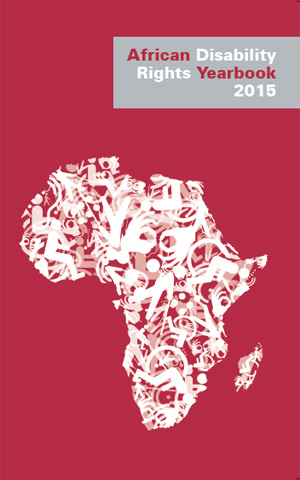African Disability Rights Yearbook Volume 3 2015
Edited by Charles Ngwena, Ilze Grobbelaar‐du Plessis, Helene Combrinck and Serges Djoyou Kamga
2015
ISSN: 2311-8970
Pages: 337
Print version: Available
Electronic version: Free PDF available
About the publication
The 2014 issue of the African Disability Rights Yearbook addresses disability rights within the foundational structure laid down by the inaugural issue. The structure comprises a tripartite division between: articles; country reports; and shorter commentaries on recent regional and sub-regional developments.
The African Disability Rights Yearbook aims to advance disability scholarship. Coming in the wake of the United Nations Convention on the Rights of Persons with Disabilities, it is the first peer-reviewed journal to focus exclusively on disability as human rights on the African continent. It provides an annual forum for scholarly analysis on issues pertaining to the human rights of persons with disabilities.
It is also a source for country-based reports as well as commentaries on recent developments in the field of disability rights in the African region.
The African Disability Rights Yearbook publishes peer-reviewed contributions dealing with the rights of persons with disabilities and related topics, with specific relevance to Africa, Africans and scholars of Africa.
The Yearbook appears annually under the aegis of the Centre for Human Rights, Faculty of Law, University of Pretoria.
The Yearbook is an open access online publication, see www.adry.up.ac.za
About the editors:
Charles Ngwena is Professor, Department of Constitutional Law and Legal Philosophy, Faculty of Law, University of the Free State, South Africa.
Ilze Grobbelaar‐du Plessis is a senior lecturer and holds the degrees BIuris LLB LLM LLD from the University of Pretoria.
Helene Combrinck is Associate Professor at the Centre for Disability Law and Policy, University of the Western Cape.
Serges Djoyou Kamgais is Senior Lecturer at TMALI (UNISA).
Table of Contents
EDITORIAL
SECTION A: ARTICLES
- The sexual and reproductive health rights of women with disabilities in Africa: Linkages between the CRPD and the African Women’s Protocol
Lucyline Nkatha Murungi & Ebenezer Durojaye - Sexual and reproductive rights of women with disabilities: Implementing international human rights standards in Lesotho
Itumeleng Shale - How assessments of testimonial competence perpetuate inequality and discrimination for persons with intellectual disabilities: An analysis of the approach taken in South Africa and Zimbabwe
Dianah Msipa - Unpaid carers of persons with disabilities in Africa and Latin America: Gender, human rights and invisibility
Marina Mendez Erreguerena - Confronting the double marginalisation of girls with disabilities: Practical challenges for the realisation of the right to education for girls with disabilities under the Disability Act of Malawi
J Nyanda - The hugger-mugger of enforcing socio-economic rights in Ghana: A threat to the rights of persons with disabilities
Justice Srem-Sai
SECTION B: COUNTRY REPORTS
- Eritrea
Futsum Abbay - Lesotho
Itumeleng Shale - Morocco
Arlene S Kanter - Sierra Leone
Romola Adeola - Swaziland
Simangele Daisy Mavundla\ - Tunisia
Arlene S Kanter
SECTION C: REGIONAL DEVELOPMENTS
- Disability rights and emerging disability legislation in selected African jurisdictions: A diagnostic commentary
Enoch MacDonnell Chilemba - The right to political participation for people with disabilities in Africa
William Aseka Oluchina
BOOK REVIEW
- AS Kanter: The development of disability rights under international law: From charity to human rights (2014)
Tsitsi Chataika
Keywords:
